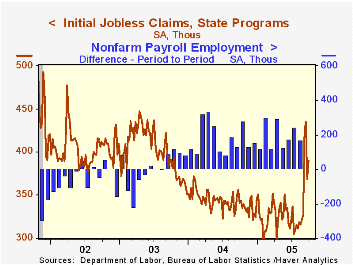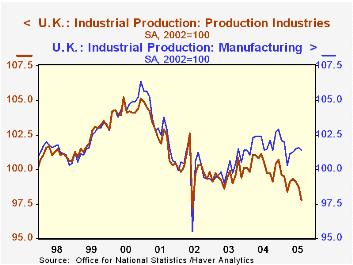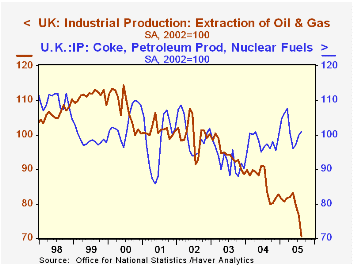 Global| Oct 06 2005
Global| Oct 06 2005Hurricanes Lifted Initial Jobless Insurance Claims
by:Tom Moeller
|in:Economy in Brief
Summary
Initial filings for unemployment insurance outpaced Consensus expectations for 365,000 claims and rose 21,000 to 390,000 last week. The prior week's decline was lessened to 66,000. The Labor Department indicated that last week 74,000 [...]

Initial filings for unemployment insurance outpaced Consensus expectations for 365,000 claims and rose 21,000 to 390,000 last week. The prior week's decline was lessened to 66,000.
The Labor Department indicated that last week 74,000 initial claims were linked to Hurricanes Katrina & Rita and totaled 363,000 during September.
The four-week moving average of initial claims rose to 404,500 (17.2% y/y) from 388,750 during the prior four weeks.
Continuing claims for unemployment insurance surged 118,000 following a downwardly revised 129,000 increase during the prior week.
The insured rate of unemployment rose to 2.3% from 2.2% the week prior. The low in early September was 2.0%.
Hurricane Katrina and the Employment Situation report for September 2005 from the US Bureau of Labor Statistics can be found here.
| Unemployment Insurance (000s) | 09/31/05 | 09/24/05 | Y/Y | 2004 | 2003 | 2002 |
|---|---|---|---|---|---|---|
| Initial Claims | 390 | 369 | 14.4% | 343 | 402 | 404 |
| Hurricane Related Claims (000, NSA) | 74 | 70 | ||||
| Continuing Claims | -- | 2,905 | 2.1% | 2,926 | 3,531 | 3,570 |
by Carol Stone October 6, 2005

UK industrial production sank in August by 0.9% from July, mainly reflecting a further plunge in oil and gas extraction, but also including decreases in several manufacturing industries. Forecasters had expected a modest increase, perhaps thinking that the oil and gas sector would rebound after two successive sizable decreases. 
Oil and gas extraction is subject to two trends, a long-run decrease as North Sea reserves dwindle, and a short-run maintenance shutdown that took longer than normal this summer. Regarding the first, output of North Sea petroleum and gas has been ratcheting lower since late 1999. The industrial production index for oil and gas extraction averaged 81.5 (index, 2002=100) during the first half of this year, compared with a peak of about 112.0 in early 2000, a total reduction of roughly 27.5%. Then each year, output is also reduced for maintenance. This slowdown occurs in late spring and summer, but the exact timing varies. Analysts apparently believed output would pick up quickly in August, although previous year's patterns indicate that it can remain relatively sluggish even through September. That said, the current drop has been very steep -- and it probably isn't helping the tight world supply situation.
Among manufacturing industries, there was a mix of ups and downs in August production. Food, textiles and paper products weakened, but furniture, chemicals and electronics gained. Notably, while production of crude oil and gas at the well have declined, refining activity has been firm in recent months. At least one press report indicated concern that oil producers weren't increasing supply in the face of rising prices. Perhaps not yet, but refiners appear to have been doing so.
| United Kingdom: % Chg* |
Aug 2005 | July 2005 | June 2005 | Year Ago | 2004 | 2003 | 2002 |
|---|---|---|---|---|---|---|---|
| Industrial Production | -0.9 | -0.4 | -0.2 | -0.5 | 0.7 | -0.5 | -2.5 |
| Oil & Gas Extraction | -7.7 | -4.0 | -4.0 | -19.4 | -8.4 | -5.6 | -1.2 |
| Manufacturing | -0.2 | 0.1 | 0.2 | 1.9 | 1.8 | 0.1 | -3.1 |
Tom Moeller
AuthorMore in Author Profile »Prior to joining Haver Analytics in 2000, Mr. Moeller worked as the Economist at Chancellor Capital Management from 1985 to 1999. There, he developed comprehensive economic forecasts and interpreted economic data for equity and fixed income portfolio managers. Also at Chancellor, Mr. Moeller worked as an equity analyst and was responsible for researching and rating companies in the economically sensitive automobile and housing industries for investment in Chancellor’s equity portfolio. Prior to joining Chancellor, Mr. Moeller was an Economist at Citibank from 1979 to 1984. He also analyzed pricing behavior in the metals industry for the Council on Wage and Price Stability in Washington, D.C. In 1999, Mr. Moeller received the award for most accurate forecast from the Forecasters' Club of New York. From 1990 to 1992 he was President of the New York Association for Business Economists. Mr. Moeller earned an M.B.A. in Finance from Fordham University, where he graduated in 1987. He holds a Bachelor of Arts in Economics from George Washington University.






